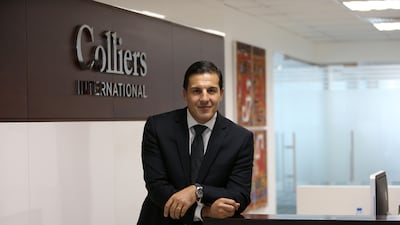For Filippo Sona, director of the hotels division for the Middle East and North Africa region at Colliers International, the short-term plan is to buy a property in Dubai as he wants to retire in the emirate. The 41-year-old Italian has been in Dubai for six years. He came from London, where he worked with CB Richard Ellis, the hotel real estate consultancy.
How did your upbringing shape your attitude towards money?
I spent my teenage years in the 1980s in Verona, northern Italy. The country was going through a good economic growth, but in a climate of transformation. As Italians, we are conservative and risk- averse. We are good at saving money. I come from a family of five, my parents, my two aunts, and I, the only child. My father used to say, for every dollar I spend, I must save 50 cents. His view was that you need to see the light through the tunnel. I take that approach for every investment I make as a professional, and for my family. If you see the light, it’s time to make the investment. Then at 19 years, I went to the UK to study undergraduate at University of West London in hospitality management. I also did an executive MBA at Oxford Brookes University and graduated in 2007. I worked with Hyatt Corporation in the US in Georgia and Florida from 1999 until 2000. This exposure to the UK market and the working environment [in the UK and the US] also shaped my way of doing investments. In the UK, where the investment market is solid, you need to take risk. It made me more astute. For any investment, I see the size, the return on investment, how long I stay in the investment, what’s there in it for me, and how am I going to come out of it.
How much did you get paid for your first job?
For my first job, I was a commis chef at the Regent London [which was renamed into The Landmark London] in 1993. It was a part of the Four Seasons hotel chain. I was paid £13,000 (Dh67,348) a year, and I stayed there for one-and-a-half years.
Are you spender or saver?
I am a saver. I believe cash is king, because cash gives power to do many things and increases your purchasing power. My philosophy is wealth preservation.
What is your most cherished purchase?
My house in West London that I purchased for £220,000 in 2006. That has been my best investment so far, because the value has tripled since then. It will go up more. It is rented out now. I don’t know if I will live there, as I want to retire in Dubai.
Where do you save your money?
I invest in properties and pension funds. I invest in big properties and never in the off-plan. I want to touch them, see the layout and see the finished product. I look to get 10 per cent return on investment in rent from the very beginning.
Do you prefer paying by credit card or in cash?
I prefer credit cards because that leaves me with cash. I use the bank’s money with the credit cards and pay them off on time. That leaves me with disposable cash.
What do you most regret spending money on and how much was it?
I regret spending money on cars in general because there is a lot of depreciation in cars. It is bad investment because you lose money. Only vintage cars are good investment, as the value goes up. In 2012 I bought a second-hand BMW for Dh120,000. I still have it. My wife has another car.
What financial advice would you offer your younger self?
What I tell my [team at Colliers] is that cash is king. If you don’t have cash, you become vulnerable. Whatever you do, make sure you have a back-up, and that back-up is cash.
Do you have a plan for the future?
My short-term plan is to buy a house in Dubai. I would like a three-bedroom duplex apartment. This is my home. It is a good time to buy, because if you buy now, you can resell it between 2020 and 2023 with a healthy profit. My long-term plan is to buy another house in London.
ssahoo@thenational.ae
Follow us on Twitter @TheNationalPF

